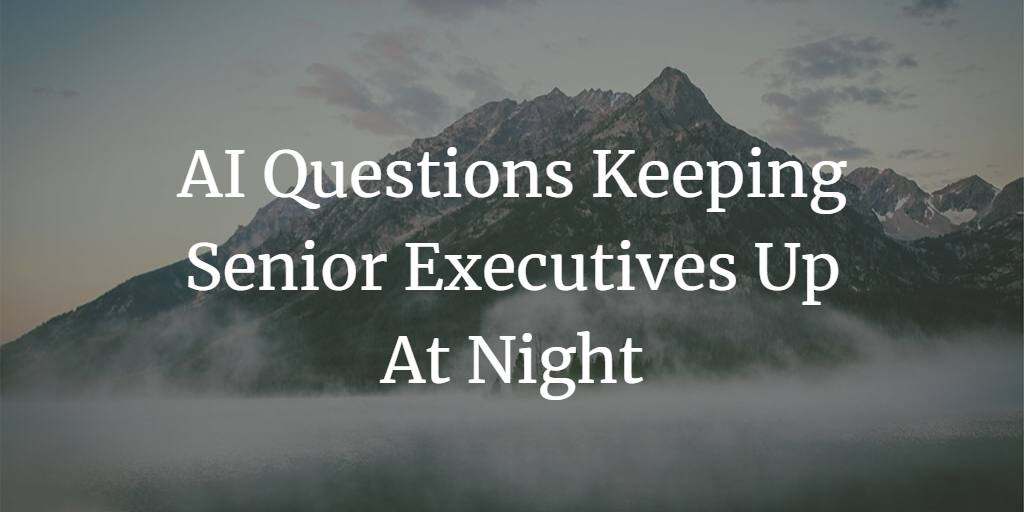The 10 Big AI Questions Keeping Senior Executives Up At Night

Table of Contents
Introduction
Question 1: AI Bias and Discrimination
Question 2: Job Displacement
Question 3: AI and Data Privacy
Question 4: AI Explainability
Question 5: AI Security and Safety
Question 6: AI Adoption and ROI
Question 7: AI Governance and Regulation
Question 8: Human-Machine Collaboration
Question 9: Keeping Up with Technological Advancements
Question 10: AI and Ethics
Conclusion
1. Introduction
The rapid advancement of artificial intelligence (AI) has raised numerous concerns for senior executives. From ethical dilemmas to technological limitations, these pressing issues demand attention and strategic planning. In this article, we'll explore the top 10 AI questions that keep senior executives up at night and discuss potential strategies for addressing these concerns.
2. Question 1: AI Bias and Discrimination
How can we ensure that AI systems are unbiased and don't perpetuate discrimination?
To address AI bias, organizations should:
Invest in diverse teams to develop AI systems
Implement thorough data analysis and preprocessing techniques
Continuously monitor and audit AI models for fairness
3. Question 2: Job Displacement
How will AI impact the job market, and how can we prepare for potential job displacement?
To mitigate job displacement, organizations should:
Invest in upskilling and reskilling programs for employees
Encourage lifelong learning and adaptability
Foster a culture of innovation and creativity
4. Question 3: AI and Data Privacy
How can we harness the power of AI while respecting data privacy and adhering to regulations?
Organizations can address data privacy concerns by:
Implementing robust data governance frameworks
Utilizing privacy-preserving techniques, such as federated learning or differential privacy
Staying up-to-date with evolving data privacy regulations
5. Question 4: AI Explainability
How can we ensure AI systems are transparent and explainable, fostering trust among stakeholders?
Promoting AI explainability involves:
Developing and adopting explainable AI (XAI) techniques
Communicating AI decision-making processes to stakeholders
Ensuring AI systems are interpretable and comprehensible
6. Question 5: AI Security and Safety
What measures can we take to safeguard AI systems from security threats and ensure their safety?
To enhance AI security and safety, organizations should:
Implement rigorous cybersecurity practices
Develop secure AI development frameworks
Collaborate with industry partners to share knowledge and best practices.
7. Question 6: AI Adoption and ROI
How can we effectively adopt AI technologies and ensure a positive return on investment (ROI)?
To maximize AI adoption and ROI, organizations should:
Develop a clear AI strategy with measurable objectives
Prioritize AI projects based on potential impact and feasibility
Continuously monitor and evaluate AI initiatives to optimize performance
8. Question 7: AI Governance and Regulation
How can we navigate the evolving landscape of AI governance and regulation?
Staying ahead in AI governance and regulation requires organizations to:
Establish internal AI ethics committees or guidelines
Collaborate with industry bodies and regulators to shape AI policies
Keep up-to-date with emerging AI legislation and industry standards
9. Question 8: Human-Machine Collaboration
How can we foster effective human-machine collaboration and optimize the benefits of AI?
Promoting successful human-machine collaboration involves:
Designing AI systems with human-centered principles
Investing in employee training and education on AI technologies
Encouraging a culture of collaboration and open-mindedness
10. Question 9: Keeping Up with Technological Advancements
How can we stay ahead in the fast-paced world of AI technology and maintain a competitive edge?
To keep up with AI advancements, organizations should:
Encourage a culture of continuous learning and innovation
Participate in industry conferences, workshops, and events
Collaborate with research institutions and technology partners
11. Question 10: AI and Ethics
How can we ensure the ethical development and deployment of AI technologies?
Organizations can promote ethical AI practices by:
Developing AI ethics guidelines or principles
Encouraging ethical considerations throughout the AI development process
Fostering open dialogue about AI ethics within the organization and with external stakeholders
12. Conclusion
As AI continues to transform the business landscape, senior executives must grapple with various ethical, technological, and strategic challenges. By addressing these pressing concerns and implementing proactive strategies, organizations can harness the power of AI responsibly and effectively, ultimately staying ahead in the ever-evolving world of AI technology.


